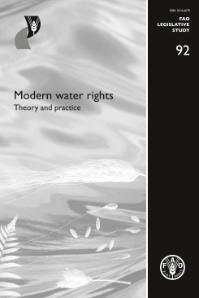The Transformation of Property Rights in Kenya's Maasiland: Triggers and Motivations
This paper explores the puzzle of why the pastoral Maasai of Kajiado, Kenya, supported theindividualization of their collectively held group ranches, an outcome that is inconsistent withtheoretical expectation.
Urban and peri-urban agriculture (UPA) studies: general overview of urban and peri-urban agriculture in the Cape Coast and Takoradi Municipalities
influence of regulatory forest policy tools on biodiversity measures for forests in Ukraine
Hydronomics and terranomics in the Nyando Basin of Western Kenya
Land Improvements Under Land Tenure Insecurity: The Case of Liming in Finland
This article solves and characterizes optimal decision rules to invest in irreversible land improvements conditional on land tenure insecurity. Economic model is a normative dynamic programming model with known parameters for the one period returns and transition equations.
Current reforms and their implications for rural water management in Tanzania
Indigenous common property resource management in the Central Highlands of Ethiopia
Navajo-Hopi land settlement [microform]hearing before the Committee on Indian Affairs, United States Senate, One Hundred Ninth Congress, first session, on S. 1003, Navajo-Hopi Land Settlement Amendments of 2005, July 21, 2005, Washington, DC
Integrated management of water, forest and land resources in Nepal: opportunities for improved livelihood
Small tank cascade systems in the Walawe River Basin [Sri Lanka].
Modern water rights
This publication offers a fresh look at the theory and practice of modern water rights, from a comparative law angle. It sheds light on a number of key features of such rights, and contrasts these to traditional forms and kinds of water rights. It teases out and discusses the relevant problematique, including in particular that elicited the sale and leasing of water rights.



